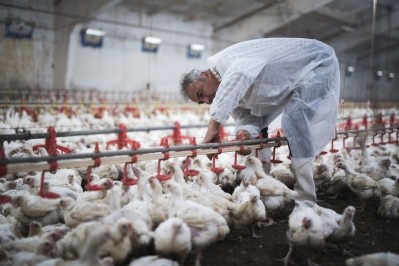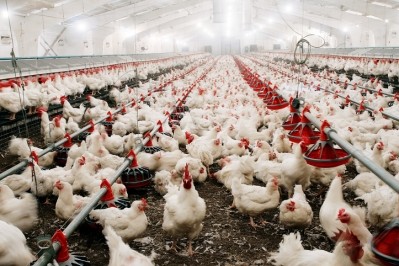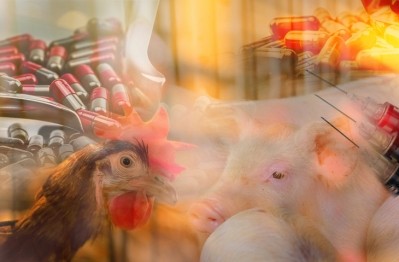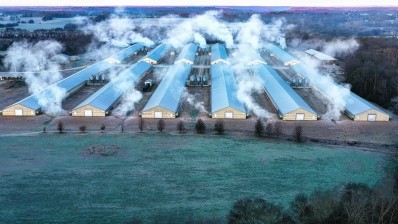FOLIUM Science looks to rebalance the microbiome, reduce ammonia production in poultry
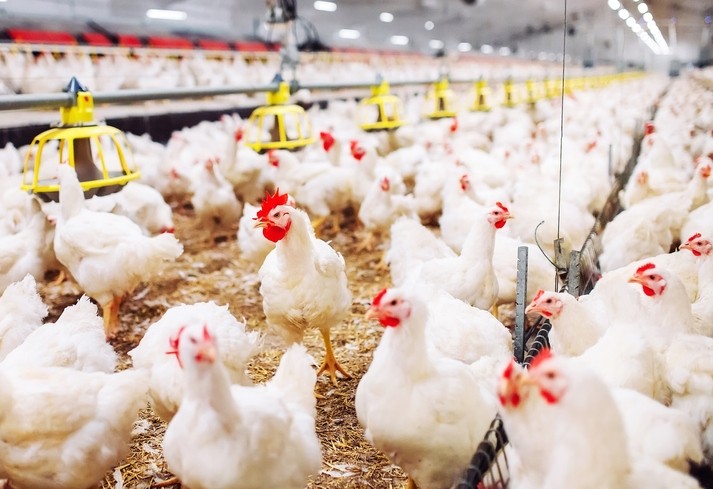
The UK based biotechnology company was established in Cambridge in 2016 and has R&D laboratories in Bristol. It has developed a biome modulator, based on CRISPR-Cas technology, to remove unwanted bacteria, while supporting the colonies that should be maintained, without the use of antibiotics, thus reducing the risk of antimicrobial resistance (AMR). Biome modulators can be delivered through the water or encapsulated in feed systems in the rearing house.
Agricultural ammonia emissions
The company won funding from Innovate UK to extend the application of that Guided Biotics platform technology to tackle the bacteria responsible for excessive ammonia production in the poultry house. “Our technology is making these bacteria less aggressive, restoring the balance in the microbiome, and reducing the amount of ammonia produced,” said Edward Fuchs, co-founder of FOLIUM Science.
Ammonia is one of the main environmental pollutants of concern in the poultry industry. The gas is a major challenge in poultry houses, with unused nitrogen in the feed converted to ammonia by bacteria in the gut.
Fuchs told us about the background to the project.
“Innovate UK has been particularly strong in supporting the life sciences area in the UK. This latest funding round was initiated in conjunction with a Department for Environment Food and Rural Affairs (Defra) call on clean air.
“Defra data shows that 6 to 13% of agricultural ammonia emissions come from the poultry sector itself, so we evaluated how we might redeploy our Guided Biotics platform to reduce ammonia production in the poultry industry. It was an important piece of R&D work given that ammonia emissions are damaging for the environment; they result in acidification of the ecosystem. Alongside ecosystem run-off, ammonia emissions can result in health issues, respiratory challenges for those working within the industry.”
The team also looked at the economic impacts that abatement of ammonia production would have in relation to bird performance.
“Excess ammonia results in decreased bird weight and it also undermines the welfare of the birds; there can be issues with corroding of the cellular lining in the birds’ respiratory tract along with increased susceptibility to infections and problems with footpad dermatitis.”
The biotech selectively targeted and silenced the genes involved in ammonia generation. “We looked at the urea producing enzymes inside the gut which are driven by relatively high protein feed use. We have been able to silence the urease gene and free up nitrogen for the birds’ access.”
Fuchs said that future work will focus on supporting the bird’s metabolism in becoming more efficient at repurposing this nitrogen into protein. “The flexibility of our technology provides the tool to enhance the metabolism.”
Targeting pathogenic bacteria
FOLIUM Science has already produced a feed additive that will protect young chicks against common bacterial infections such as Salmonella, branded as BiomElix. Next year sees the launch of the first product in Brazil, BiomElix One, an additive targeting all Salmonella serotypes, with highly specific, and targeted antimicrobial effects, and none of the bad side effects of an antibiotic.
The company’s technology, which has been endorsed by the Brazilian National BioSafety Committee (CTNBio) as a non-GM 'new-breeding technique’, is very specific in the targeting of pathogenic bacteria. The biotic is guided into a place in the bacterial cell where it makes the cut and causes the bacteria to digest itself.
While the additive is approved in Brazil, the regulatory pathway in other markets is "clear but different."
“We see that our conversations are now beginning to evolve with regulators in the US and in other territories such as the UK with it considering utilising gene editing as a technology for agriculture.”
Lateral flow tests
FOLIUM Science is to announce its latest project developing new applications of its CRIPSR-Cas portfolio, a rapid lateral flow test for Salmonella, at the Agri-TechE REAP conference on November 8. “The launch of SWIFTR perfectly complements our feed additive portfolio,” said the CEO.
The first product in the SWIFTR range will be launched at REAP and it is for the rapid detection of Salmonella in poultry production. The time it takes to get the test result and identify an infection is reduced to one hour compared to currently available tests which can take up to five days. “It dramatically reduces the time for farmers to get a decision,” remarked Fuchs.
The test is simple to use and requires no special training or laboratory equipment so that it can be carried out on the farm or where action can quickly be taken to protect the health of the flock and to prevent the spread of infection, according to the company.
Because SWIFTR is a molecular test that uses advanced molecular biology, it can identify small pieces of genetic material from the pathogenic bacteria that the user is looking for in the sample, even down to individual Salmonella serovars where necessary. This means that the test is extremely accurate, said the developer.
The extent of the infection can also be quantified so that the appropriate measures can be put in place.
“Our first SWIFTR test is for the detection of Salmonella but we are also developing tests for other bacteria such as Enterococcus, Clostridium and E. coli. And whilst poultry production is the first step on the ladder, there are numerous applications in animal farming and across the food industry for a test that is quick, simple, and accurate. We are working with our partners in the poultry industry to roll out the use of SWIFTR in poultry production in early 2024.”
